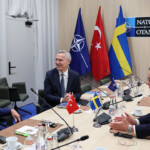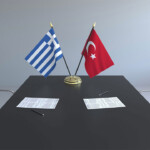Prof Gökhan Bacık teaches political science at Palacky University in Moravia, Czech Republic. His research interests include the modern Middle East, Islam and politics, and Turkish politics. He sat down to answer FTP’s questions about the Turkish political and religious landscape after the elections.
Post-election Turkey shows strong signs of a Kulturkampf: A toxic TV series with character assassinations, festivals feeling the pressure of closures, imam appointments in schools, smearing of public figures like Dizdar after winning Cannes prize, a muhtar trying to ban men and women celebrating together at weddings, etc.
Are these signs of a new or simply expanding project of the government’s? If so, what can we expect?
The defeat in the recent presidential elections has almost terminated the opposition in Turkey. It exists, but we all know that the opposition has virtually no ability or power to affect change anymore. I am afraid a paralyzed opposition in politics will only serve to justify the ruling party. Having ‘destroyed’ the opposition, the government now has a full mandate to shape culture and politics.
The secular culture had long been limited to urban spaces in Turkey. That secular space is likely to face further pressure. Though the government has a role in these developments, more critical is where the balance will be achieved. Will Turkish people tolerate a full swing to new codes of daily life, in which festivals are forbidden? We will see.
On the agenda now is the debate over a new constitution with the emphasis on “national moral values of family,” etc. Given the domination of the conservative/nationalist block of parties in Parliament (about 10 of the 15 in total) reaching the critical majority (over 410 seats), how do you see the prospects of a conservative constitution, and what would it mean in the context of ending the republic as we know it?
This might be an option if the ruling AKP sees a political opportunity there. Otherwise, Erdoğan is transforming the state as he wishes. Many fields in Turkey such as media, education, social life have already become more Islamic in the last two decades.
My concern is that Erdoğan may use the conservative bloc in parliament to justify a more complex transformation. Turkish people are always ready to buy a reform in the name of returning to cultural roots.
But a key feature of Turkish Islamism is “gradualism.” Turkish Islamic and Islamist groups, unlike Iran, are never revolutionary. Islamists in Turkey are clever enough to know that gradualism is the best strategy for them.
Some argue that, with the AKP losing its appeal as a party in the last vote, and the rise of nationalist parties, that a shift within the Turkish right will define the course of Turkey into the next centennial. Is this a character change of the regime? Is there a new type of fusion within “Turkish-Islamic Synthesis” taking place?
The relationship between religion and politics in Turkey is one of the most difficult issues to explain. But the way the Islamist AKP and ultra-nationalist MHP cooperates today is unprecedented.
TheAKP’s embrace of nationalism is beyond the limits of an Islamist party. On the other hand, we never see these two parties ‘mix’ with each other. The dialogue is mainly sustained and limited by high-level contact between Erdoğan and Bahçeli. I think this is a “path-dependent process” and it will generate peculiar outcomes.
I am a bit skeptical about the “Turkish Islamic Synthesis”. Nobody exactly knows what it is. It is mostly a legitimizing term for both sides to embrace the opposite.
The main loser of the elections was the CHP, founding party of the republic. What do you foresee with this party vis a vis its voter segments? And how about its future?
CHP is the ‘government’ of the secular Turks. They support the party even if they are not happy about its leadership and policies. Unless there is a strong grassroots pressure for change, a complex change is not realistic.
Yet, the critique of CHP should not cover up the problems of secular voters. Thus, we have to ask, will CHP voters change? Secular people should understand that secular life does not necessarily mean democracy and being pro-Western. The world has many authoritarian and anti-Western secular countries.


